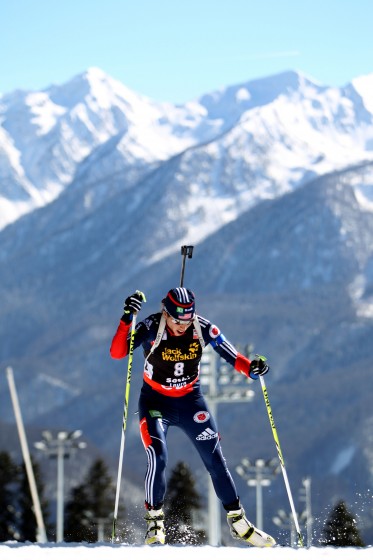
After three stages in today’s 15 k World Cup individual races at the Laura Biathlon Stadium in Russia, two U.S. women were ranked in the top five, and both had shot clean on the first 15 targets of the competition.
Actually, in real time, they were ranked even better – Susan Dunklee, wearing bib eight, was the leader when she came into the range the final time. By the time Annelies Cook arrived at the same point in bib 30, she booted Dunklee’s time out and took the honor herself.
It wasn’t to last – Dunklee missed one shot in that last stage and Cook three – but the pair still raced to season-best performances at the end of the day, with Dunklee ending up seventh and Cook 14th. For Cook, it was also a career-best; Dunklee has only had a better result once.
Not a bad omen considering this was the first competition on the new Olympic trails. And what’s more, neither of them felt like they were flying.
“Hard,” Dunklee said when FasterSkier asked her about the trails. “Very, very hard. I think everybody out there was hurting today. Nobody I talked to said that they felt great.”
Well, one person felt okay – Darya Domracheva of Belarus, who blew the rest of the women out of the water en route to the win, her third of the season. Despite two penalties, her margin of victory was 34.6 seconds over Russia’s Olga Zaitseva. That was due to fast skiing, as Domracheva bested the next-fastest woman, Miriam Gossner of Germany, on the trails by over a minute and a half.
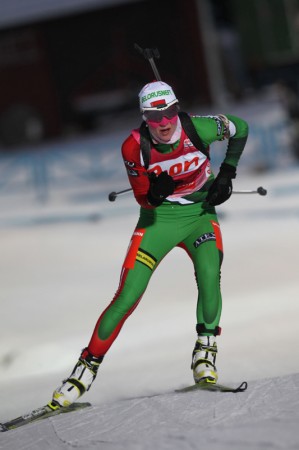
“It was really important not only going into next year, but also for this season,” Domracheva said of her win. “This has been a very hard season for me, with a lot of up and down – very down! So this is important, and I felt good. This is a course where you need to use your muscles and your brain together.”
Just as Domracheva said she saved some power for the last loop, so did Cook and Dunklee. A big part of the Americans’ strategy was to not start out too fast in this longest of competition disciplines, especially considering the altitude and the brutal hills that cross country skiers previewed earlier this season.
“The course is so hard here that I was trying to just kind of stay even and not blow up,” Cook told FasterSkier. “I was lucky because I had a ride with Tiril Ekhoff [of Norway] pretty much from the start, so every lap I just got in right behind her. I didn’t have any idea how well I was skiing at all. It’s such a hard course that I felt like I was skiing pretty slow.”
She ended up skiing the tenth-fastest time of the day, and Dunklee the 17th.
“I don’t think of myself as the best climber, I really like to V2,” Cook said. “So I was really surprised to be honest. But I do like skiing at altitude – I really like the skiing at Antholz, that feels good to me, so maybe that helps. But it just was one of those days when you’re out skiing and you’re going well, but it doesn’t feel like you’re on fire.”
For Dunklee, the result was gratifying because after an up-and-down World Championships, where she skied excellent relay legs and placed 15th in the individual, she immediately got sick – and struggled through several different iterations of a cold, missing out on some fun and important training in Inzell.
By last weekend, when the World Cup resumed in Oslo, she was mentally ready for a good race, but her body wouldn’t cooperate. In one of the season’s low points, she missed qualifying for the pursuit.
“I think it just took time to fight off the bug that I had after World Champs,” Dunklee said. “I wouldn’t say that my skiing felt sharp today, but it definitely felt more normal than it had in a couple of weeks. And today it was more important to shoot well anyway.”
Individual races have been her strength recently – the 15th place at World Championships was the women’s team’s best result, and the previous year she had placed fifth. Having started biathlon only after college and considering herself a stronger skier, it’s mental shift to be able to rely on good races in this format where each missed shot is penalized not by a 150-meter loop of skiing, which takes between 20 and 25 seconds, but by an entire minute of additional time.
“It kind of confuses me,” Dunklee admitted. “I mean, not really, but it’s strange – I’m not always the strongest shooter when we’re doing drills and stuff in practice. Skiing tends to be my strength most of the time. But for some reason those individuals keep coming together for me, so I’m not going to complain too much! It’s a big confidence booster for me every time that it happens.”
While there’s more pressure to shoot well in an individual, there’s also, in a way, more freedom. Dunklee guessed that might be what was enabling her good shooting.
“If anything I’m willing to give myself an extra second or two to take an extra breath, because the time, losing a couple of seconds isn’t as big of a deal compared to losing a minute for a miss,” she explained.
A career best was also a big reward for Cook, who has been climbing the results sheet all season, first notching her first top-30, then her first top-20. But it hasn’t all been easy, and there have been plenty of disappointing races and missed targets in the mix, too.
“I was really happy to clean the first three, because I’ve been struggling on the shooting range on and off all winter, and working on things,” Cook said. “So just having cleaned those was good.”
U.S. coaches didn’t tell her what a great race she was having, but Cook “knew that if I cleaned that last stage it would be a good day for me.” Perhaps that allowed her to get a little ahead of herself – in any case, things came a bit unglued in the final standing stage.
“I was trying to just focus on the things I had been working on in standing,” she said. “I didn’t do the best job. I hit the first one and I thought, ‘oh good! At least now I’m not going to dirty my last stage!’ and then I hit the next shot and I thought, ‘maybe I can clean this one too!’ When I missed the next one it became, ‘well maybe I can hit the rest of them,’ and when you start thinking like that, it’s game over.”
It was, and it wasn’t – at that point, support staff finally told her how well she was racing.
“That’s when the coaches started giving me information, like, you’re in tenth place and it’s six seconds to eighth,” Cook said. “I thought ‘Oh my God, okay, even with three penalties?’ So that was really exciting for me, to come across the line and watch how it was happening. It was fun.”
Combined with Tim Burke’s fifth-place finish a few hours later, it was a pretty significant day of racing for the Americans.
“I am so excited to see two top 15 results on the Olympic course from the women,” USBA President Max Cobb told FasterSkier. “This is a perfect way for the team to start the road to Sochi. It is indicative of the progress made this season by Susan and Annelies and of the potential for next season. Tim’s performance was the icing on the cake – I don’t remember a better day for the women and men together.”
Sara Studebaker rounded out the U.S. squad in 43rd with two penalties; for Canada, Megan Imrie led in 57th, followed by Zina Kocher in 73rd.
Chelsea Little
Chelsea Little is FasterSkier's Editor-At-Large. A former racer at Ford Sayre, Dartmouth College and the Craftsbury Green Racing Project, she is a PhD candidate in aquatic ecology in the @Altermatt_lab at Eawag, the Swiss Federal Institute of Aquatic Science and Technology in Zurich, Switzerland. You can follow her on twitter @ChelskiLittle.

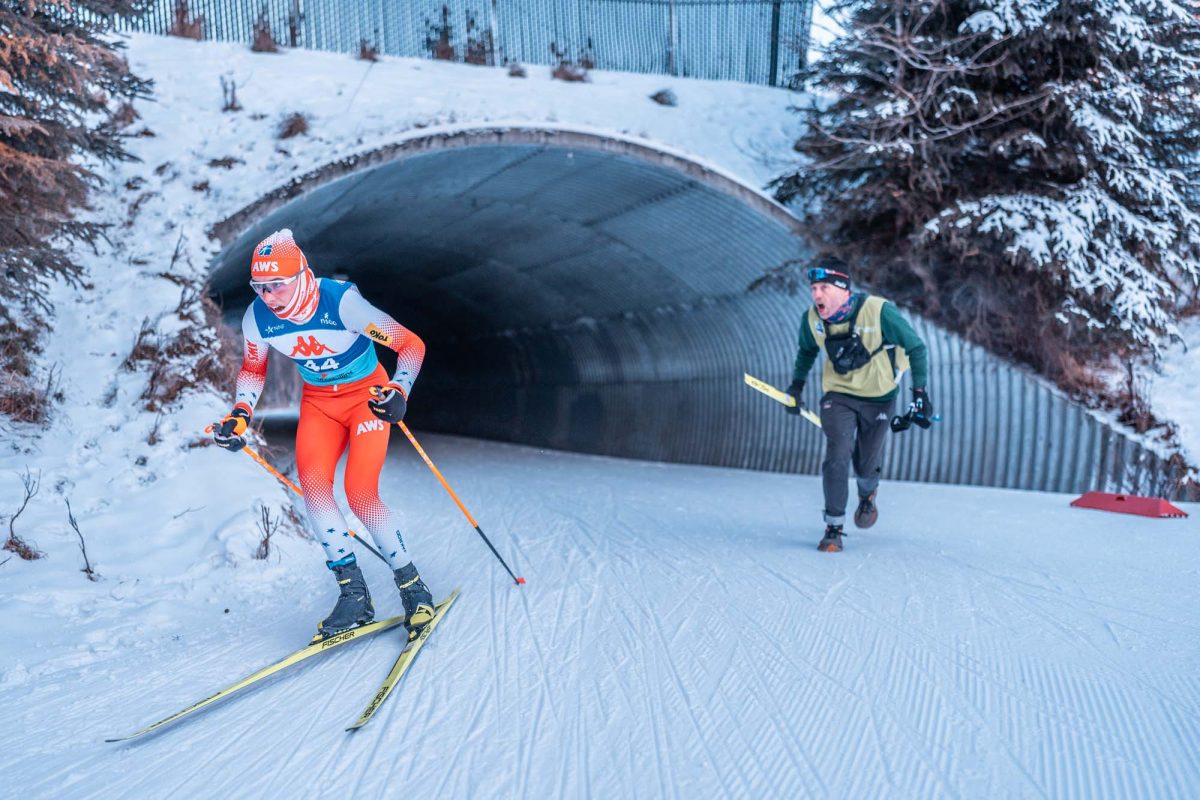
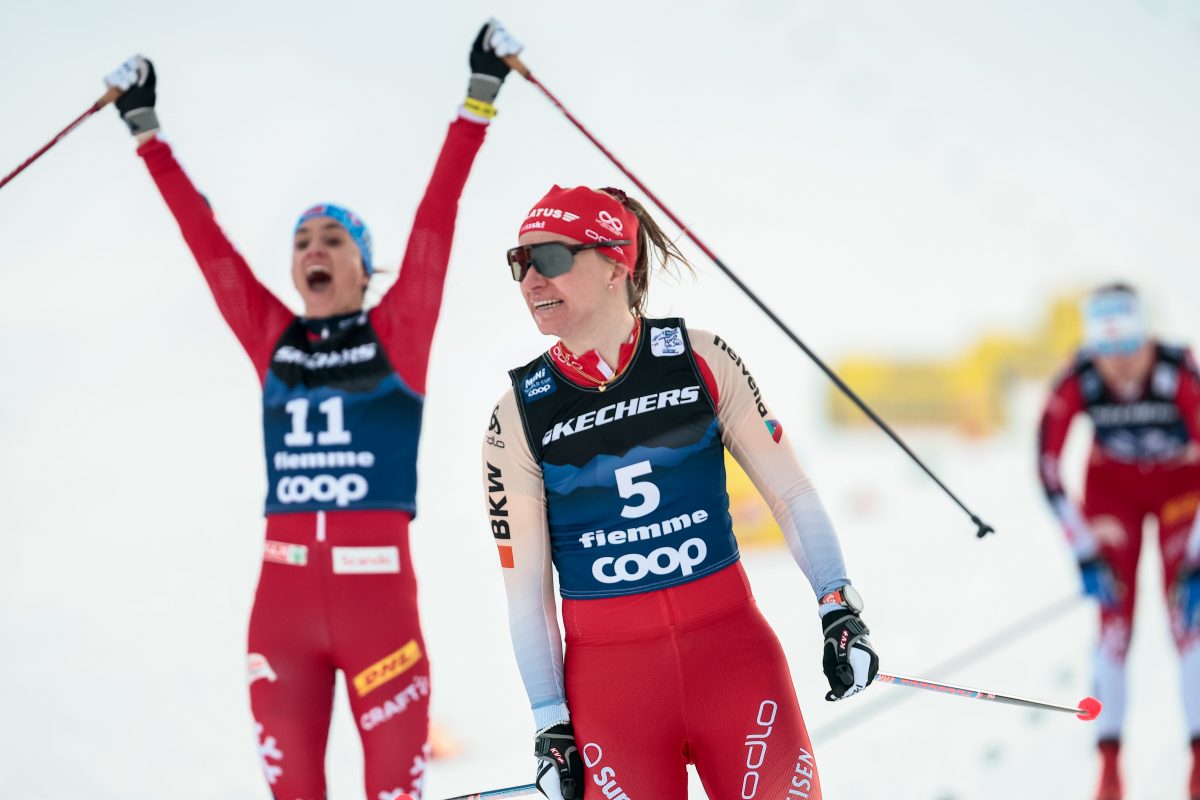
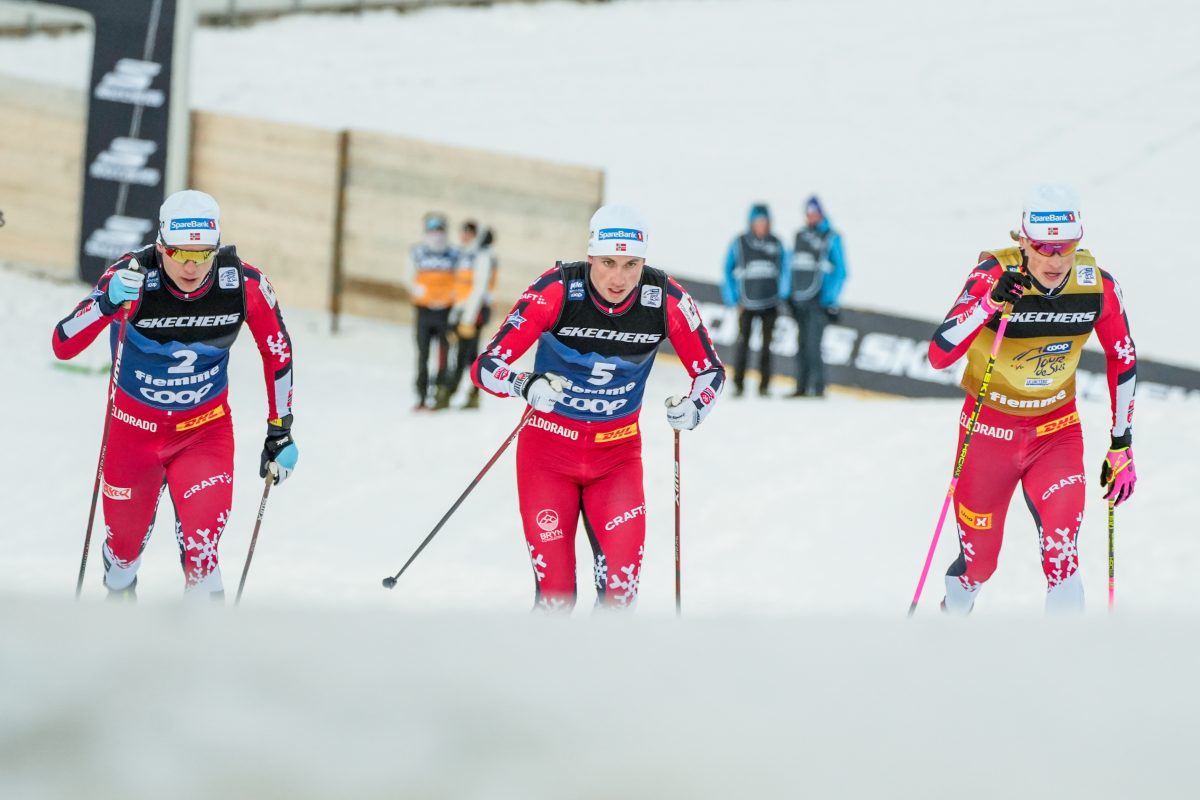
One comment
nyctvt
March 8, 2013 at 6:47 am
What’s going on with Sara Studebaker? Even when she has shot well she hasn’t made it into the points. Has she been sick?